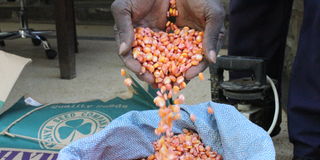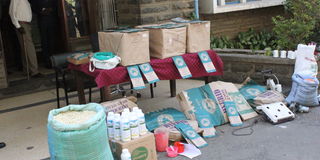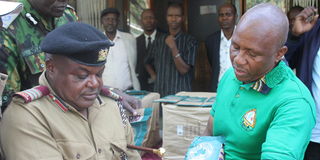How fake seeds merchants prey on unsuspecting farmers in Nakuru

Fake seeds worth Sh 13 million have been confiscated by DCI officers in Njoro.
Fake seeds worth Sh 13 million have been seized by the Directorate of Criminal Investigations (DCI) officers in Njoro.
The raid was conducted yesterday on a company that was registered as a timber yard. Upon investigation, it was discovered that the company was processing fake seedlings.
Stephen Gecharo is the main suspect who was arrested in possession of these fake seedlings.
Speaking to Simon Maina, the acting director of the Seeds certification and Plant Variety Protection at the Kenya Plant Health Inspectorate Service (KEPHIS) he notes that so far in Nakuru, three arrests have been made in connection to fake seeds.

Police display some of the farm inputs seized in Njoro on March 20, 2024.
“Some of the notorious places that this illegal trade occurs is Njoro, where we made two of the three arrests. Nakuru is the epicentre of agriculture in our country and therefore many of these individuals would like to take advantage of the farmers who are preparing for the planting season,” he says.
He adds that planting fake seeds has very huge implications especially to the large-scale farmers.
Maina further explains “For example, we have 30,000 packets which have 60,000 kilograms of seeds. When this is divided among 10 farmers who will buy and plant these seedlings, then we have 6,000 acres of land on fake seedlings.”
Sadly, these seeds come in packaging that looks the same as those with genuine seeds. The only way a farmer will know they were duped, is after realising suspiciously low harvest.
So how can farmers distinguish between genuine and fake seeds?
Every genuine packet comes with a sticker, which upon scratching you will be able to see a number. Send that number to 1393 as an SMS and you will be able to know whether the seeds are genuine or not.

County Commisioner Loyford Kibaara and Simon Maina Acting Director of the Kenya Plant Health Inspectorate Service (KEPHIS) inspecting the seized maize seedlings on 20th March 2024.
The County Commissioner Loyford Kibaara said that the multi-agency team will remain on high alert so as to be able to thwart any plans to sell these fake seeds to the farmers.
He notes, “I would like to urge members of the public to remain vigilant when buying seeds and to be able to conduct proper due diligence on the seeds they are buying.”
